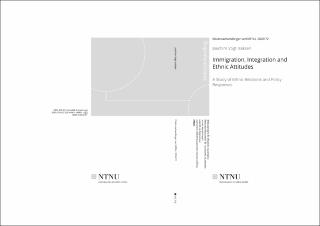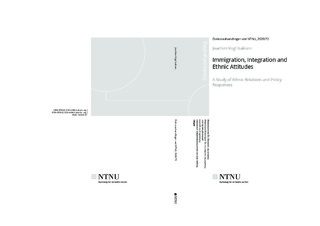| dc.contributor.advisor | Jakobsen, Tor Georg | |
| dc.contributor.advisor | Strabac, Zan | |
| dc.contributor.author | Isaksen, Joachim Vogt | |
| dc.date.accessioned | 2020-03-02T15:07:40Z | |
| dc.date.available | 2020-03-02T15:07:40Z | |
| dc.date.issued | 2020 | |
| dc.identifier.isbn | 978-82-326-4496-4 | |
| dc.identifier.issn | 1503-8181 | |
| dc.identifier.uri | http://hdl.handle.net/11250/2644755 | |
| dc.description.abstract | The overarching topic of this thesis is ethnic attitudes in view of social and economic changes, and how this is dealt with through policy measures.
The reason for writing this thesis is twofold; 1) to study ethnic attitudes widely by using quantitative data, varying between multilevel analysis and time series data. The aim here is to explore factors that influence ethnic attitudes and to what extent attitudes depend on circumstances such as social and economic conditions, as well as the ethnic composition of a society and 2) identifying suggested policy measures on immigration and integration, by using Sweden and Norway as illustrative examples. The second part provides an in-depth analysis of how immigration and integration is framed and discussed at the “elite level”, and what kind of policy practices and solutions are suggested.
The main findings provide insight into how countries respond to immigration, and thereby understand how to alleviate tension between immigrants and members of the majority populations. Several conclusions have been drawn from the four research articles. First, there is a link between social and economic conditions, and attitudes toward immigration. However, ethnic attitudes vary extensively both nationally and regionally, as well as over time. The main pattern found is that people living in Western countries, which are characterized by having the most stable economies, are the most tolerant toward immigration; while less economically developed countries generally are more skeptical. The data also indicates that for the countries which were relatively wealthy before the crisis, the impact of the economic crisis on immigrant attitudes was quite modest.
The regional variations follow the same pattern as those observed at the national level. Comparisons of regions in Europe show that poorer regions are more negative towards immigration compared to wealthier regions. Another pattern shows that increased diversity and thus contact between the majority and the minority population leads to increasingly tolerant attitudes, but only up to a certain point. A further increase in diversity seems to lead to more skepticism towards immigration. However, this “critical” point varies between countries, and factors such as national and regional social and economic circumstances seem to have moderating effects. Attitudes are also sensitive to economic fluctuations, especially in countries that are the least economically developed. Overall, an increase in negative attitudes can be observed relatively soon after an economic downturn.
The case study of Sweden and Norway gives an overview of how immigration is perceived among important actors which contribute to the shaping of national immigration policy. The empirical findings in this paper illustrate how actors at the macro level might function as actors on how attitudes are formed. The last study provides an insight into how policy responses may develop and vary over time at the “elite level” of society. It also provides an insight into how the measures of immigration and integration policy develops and varies over time. | nb_NO |
| dc.language.iso | eng | nb_NO |
| dc.publisher | NTNU | nb_NO |
| dc.relation.ispartofseries | Doctoral theses at NTNU;2020:72 | |
| dc.relation.haspart | Paper 1:
Jakobsen, Tor Georg; Isaksen, Joachim Vogt; Skavhaug, Gunn Kari O; Bakkan, Hilde Anderssen.
The turning point of tolerance: Ethnic attitudes in a global perspective. International Journal on Minority and Group Rights 2016 ;Volum 23.(1) s. 80-104
https://doi.org/10.1163/15718115-02301001
Also available at http://hdl.handle.net/11250/2473802 | |
| dc.relation.haspart | Paper 2:
Isaksen, Joachim Vogt; Jakobsen, Tor Georg; Filindra, Alexandra; Strabac, Zan.
The return of prejudice in Europe’s regions: The moderated relationship between group threat and economic vulnerability. Nationalism & Ethnic Politics 2016 ;Volum 22.(3) s. 249-277
https://doi.org/10.1080/13537113.2016.1203693
Also available at http://hdl.handle.net/11250/2473807 | |
| dc.relation.haspart | Paper 3:
Isaksen, Joachim Vogt.
The impact of the financial crisis on European attitudes toward immigration. Comparative Migration Studies 2019 ;Volum 7.(1) s. 1-20
https://doi.org/10.1186/s40878-019-0127-5
This article is distributed under the terms of the Creative Commons Attribution 4.0 International
License (CC BY 4.0) (http://creativecommons.org/licenses/by/4.0/), | |
| dc.relation.haspart | Paper 4:
Isaksen, Joachim Vogt.
The Framing of Immigration and Integration in Sweden and Norway : A Comparative Study of Official Government Reports.
The final published version is available in Nordic Journal of Migration Research 10(1), pp.106–124.
http://doi.org/10.2478/njmr-2019-0033
This work is licensed
under the Creative Commons Attribution-NonCommercial-NoDerivatives 4.0 License (CC BY-NC-ND 4.0) | |
| dc.title | Immigration, Integration and Ethnic Attitudes: A Study of Ethnic Relations and Policy Responses | nb_NO |
| dc.type | Doctoral thesis | nb_NO |
| dc.subject.nsi | VDP::Samfunnsvitenskap: 200::Statsvitenskap og organisasjonsteori: 240 | nb_NO |

